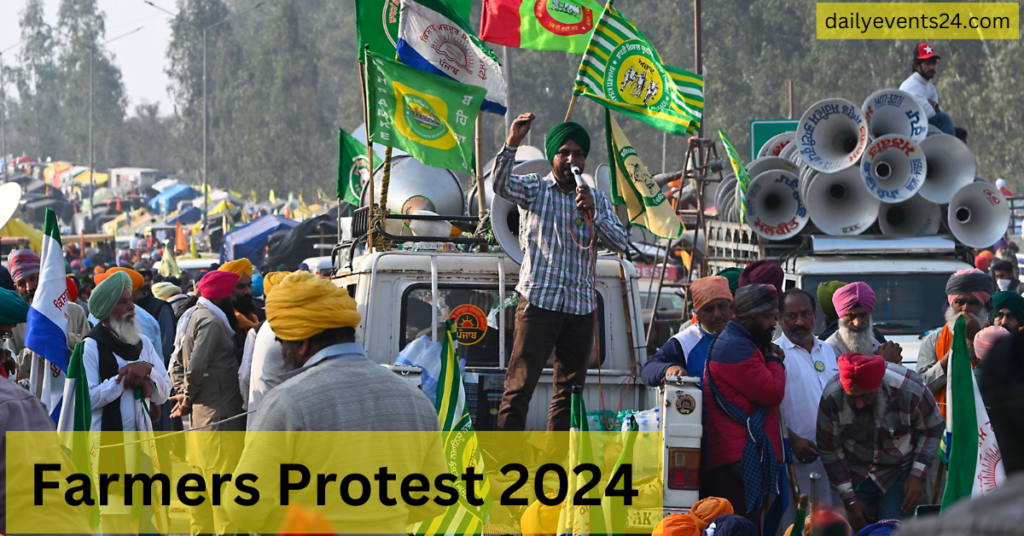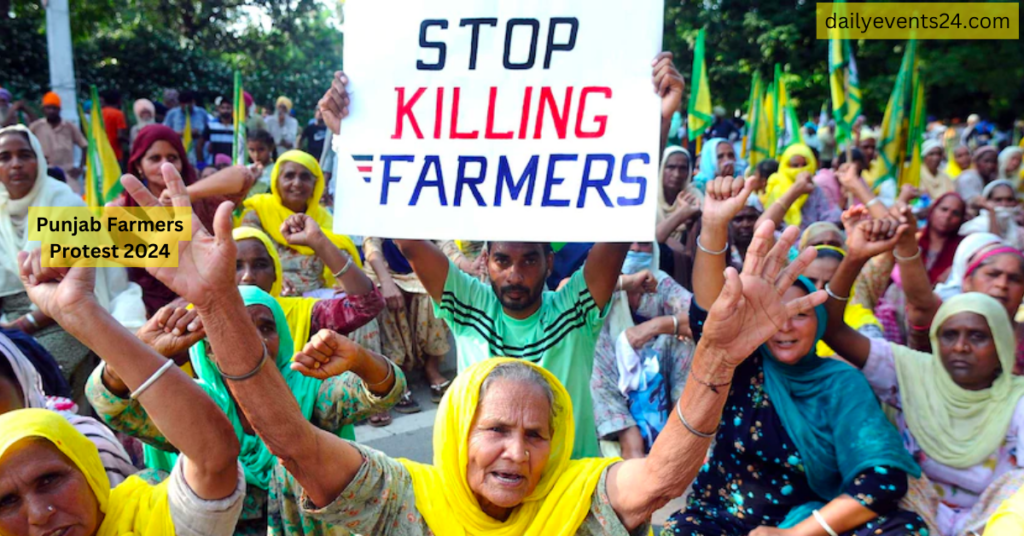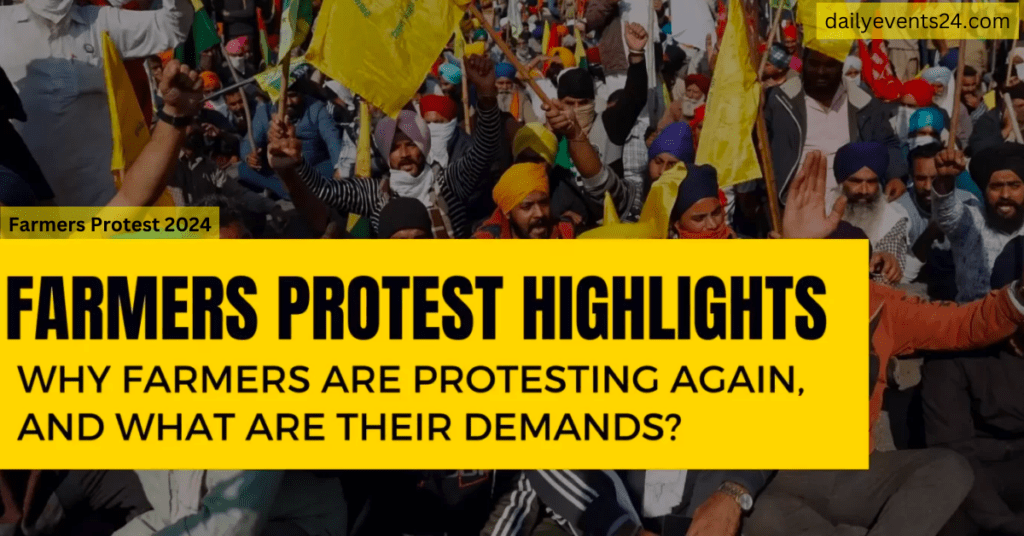The Punjab Farmers Protest is a nonviolent but effective movement that has been taking place in the center of India. People all across the world are paying attention to this movement, which is bringing up issues related to livelihoods, agriculture, and the future-shaping role of farmers. We will dissect the main features of the demonstration in this piece, looking at its inception, goals, and effects on the country and farmers.
Table of Contents
What Is Farmers Protest?
1. The history of Indian agriculture
A sizable section of the country’s population makes their living from farming, making India a global leader in agriculture. Punjab, sometimes referred to as the “Granary of India,” is essential to the production of food. But as time went on, farmers had to deal with issues like erratic weather patterns, mounting debt, and shifting crop prices.

2. Overview of Farm Bills
The government has introduced three farm bills, which are the source of the protest. With the intention of fostering a more open and competitive market, these bills sought to reform the agriculture industry. Nonetheless, a lot of farmers voiced worries about how these bills might affect their customary farming methods, particularly in Punjab.
3. What Punjab Farmers Want?
Fear of losing the Minimum Support Price (MSP) system, which ensures a minimum price for their crops, is the primary concern of the farmers participating in the protests. Farmers are concerned that the new regulations may allow large corporations to take advantage of them and weaken their negotiating position.
4. Role Of Middlemen
The role of middlemen in the agricultural supply chain is one of the main causes of the protest. These middlemen, who keep a portion of the proceeds, are frequently used by farmers to sell their produce. Farmers worry that the new laws, which aim to lessen reliance on middlemen, could expose them to corporate exploitation.
5. What is MSP?
The importance of MSP lies in its ability to protect farmers from market fluctuations by ensuring that they receive a fair price for their crops. Protesters claim that because the new laws do not guarantee MSP, farmers may be forced to rely on market forces.


6. Impact on Small Farmers
A large proportion of the protesting group consists of small and marginal farmers who are concerned that they may not be able to maintain their standard of living in the absence of MSP. Many farmers are using the current protest as a platform to express their concerns because they are afraid of being overshadowed by larger agribusiness companies.
7. Unity in Diversity
The demonstration has united farmers from various communities, age groups, and backgrounds, demonstrating the community’s unity. This group effort demonstrates the common perception that the new regulations may negatively impact the fundamental basis of their farming methods.
8. Calm Farmers Protest
The protests have mostly stayed calm despite the size of the movement. To voice their complaints and make their voices heard, farmers have taken part in sit-ins, marches, and road blockades, among other nonviolent forms of resistance.
Government Response On Farmers Protest
| Conversations and Deadlocks | Fears of Corporatization |
| In an effort to reach a compromise, the farmers and the government have held numerous rounds of discussions. But as of right now, no firm agreement has been made. Farmers emphasize the need for legal assurance of MSP and continue to demand the repeal of farm laws. | To reach a compromise, the farmers and the government have held numerous rounds of discussions. But as of right now, no firm agreement has been made. Farmers emphasize the need for legal assurance of MSP and continue to demand the repeal of farm laws. |


National And International Impact On Punjab Farmers Protest
| Cross-Border Solidarity | Global Repercussions |
| The Punjab Farmers’ Protest has attracted support from many foreign communities in addition to those in India. Globally, organizations, activists, and celebrities have shown support for the farmers and brought attention to their cause. | The demonstration has spurred debates about the status of agriculture throughout the world, with several nations considering how to strike a balance between modernization and the preservation of traditional farming methods. The outcome of the demonstration may establish a standard for future national approaches to agricultural reforms. |
Also Read:- About Black Day 2024- Pulwama Attack 14th Feb
The Punjab Farmers Protest is an intricate and diverse movement that exists outside of Punjab. It stands for the hardships faced by farmers who have strong ties to the land and their customs. The world watches, hoping for a resolution that takes into account the farmers’ concerns and promotes constructive changes in the agriculture industry, as the government and farmers continue their dialogue. The path taken by the Punjab Farmers’ Protest is evidence of the strength of solidarity and the tenacity of people who work the land in search of a better future for themselves and future generations.
Frequently Asked Question [Punjab Farmers Protest]
Q1:- What is the Punjab Farmers Protest, and what major concerns prompted it to start?
Answer:- Punjabi farmers have launched a protest movement in opposition to three new government-introduced agricultural laws. Concerns regarding the Minimum Support Price (MSP) system, possible corporate exploitation, and the function of middlemen in the agricultural supply chain are among the main issues.
Q2:- What makes Punjabi farmers unique from those in other states, and why are they protesting specifically?
Answer:- Punjab is renowned as the “Granary of India” and is heavily dependent on agriculture. Here, farmers are especially worried about how the new laws will affect their customary farming methods, specifically with regard to the MSP system. Farmers in other states voice similar worries, but the level of demonstrations varies.
Q3:- Which three farm bills set off the protests, and what changes are they trying to make to the agricultural industry?
Answer:- The three farm bills are the Essential Commodities (Amendment) Bill, the Farmers (Empowerment and Protection) Agreement on Price Assurance and Farm Services Bill, and the Farmers’ Produce Trade and Commerce (Promotion and Facilitation) Bill. Their goals are to ease restrictions on the sale of specific commodities, give farmers more options, and liberalize agricultural trade.
Q4:- How does the Minimum Support Price (MSP) relate to farm laws, and why are farmers concerned about it?
Answer:- Farmers worry that the Minimum Support Price (MSP) system, which sets a minimum price for their crops, may not remain in place as a result of the new laws. There is uncertainty about MSP, which has raised fears that farmers won’t be able to get fair prices for their produce.
Q5:- Why are small and marginal farmers leading the protests, and how do the farm laws affect them?
Answer:- Many of the protesting farmers are small-scale and marginal farmers. They fear they won’t be able to support themselves without the guarantee of MSP and that bigger agribusinesses will overshadow them. Their active involvement in the protests has been motivated by this fear.
Q6:- Why are farmers worried about middlemen’s involvement in the agricultural supply chain, and what role do they play in the Punjab Farmers Protest?
Answer:- Traditionally, middlemen have helped to link farmers and buyers. The goal of the new laws is to lessen reliance on middlemen, but farmers are concerned that this could leave them vulnerable to corporate exploitation. The protests have been sparked by worries about how this would affect farmers’ ability to bargain.
Q7:- Has the government held talks with the farmers who are protesting, and what was the result of these conversations?
Answer:- To identify points of agreement, the government and the farmers have held several rounds of discussions. But as of right now, no firm agreement has been made, and the farmers are still calling for the farm laws to be repealed.
Q8:- What kind of global support have the protests by the Punjab farmers received, and how have they drawn attention from around the world?
Answer:- Numerous nations have expressed support for the protests, which have drawn attention from around the world. Globally, organizations, activists, and celebrities have shown support for the farmers and brought attention to their cause.
Q9:- What possible effects might the Punjab Farmers Protest have on agricultural reforms from a global perspective?
Answer:- Global conversations regarding striking a balance between modernization and the preservation of traditional farming methods have been spurred by the protest. The outcome of the demonstration may establish a standard for future national approaches to agricultural reforms.
Q10:- What measures have the protesting farmers taken to ensure the peaceful nature of their demonstrations?
Answer:- Despite the magnitude of the movement, the protests have largely remained peaceful. Farmers have employed various forms of nonviolent resistance, such as sit-ins, marches, and road blockades, to express their grievances and make their voices heard.

